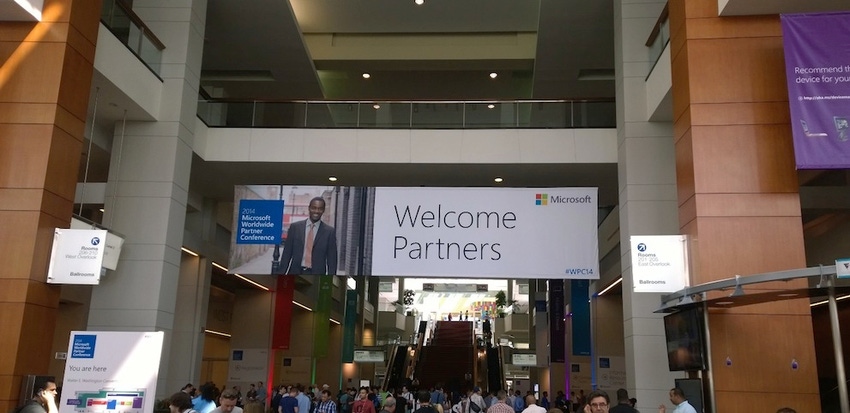At this year's Microsoft Worldwide Partner Conference, it was clear that MSPs are positioned to play an expanding role in helping their customers navigate, compete and succeed in the technological arena that is transforming the way business is done.
July 31, 2014

By Accelerite Guest Blog
 This year’s edition of Microsoft’s Worldwide Partner Conference (WPC), which ran from July 13 through 17 in Washington, D.C., was packed with pithy content and many discussions about the technologies and innovations shaping businesses and consumers around the world. Evident from WPC is that MSPs are positioned to play an expanding role in helping their customers navigate, compete and succeed in the technological arena that is transforming the way business is done.
This year’s edition of Microsoft’s Worldwide Partner Conference (WPC), which ran from July 13 through 17 in Washington, D.C., was packed with pithy content and many discussions about the technologies and innovations shaping businesses and consumers around the world. Evident from WPC is that MSPs are positioned to play an expanding role in helping their customers navigate, compete and succeed in the technological arena that is transforming the way business is done.
Let’s examine some key takeaways from the 2014 WPC and the implications for MSPs.
1. Cloud
The overriding theme at WPC, as well as the new Microsoft mantra, was “mobile-first, cloud-first world.”
While Microsoft always seems to mention the mobile part before cloud, I’m going to switch the order here and start with cloud. The cloud serves as the incubator and petri dish for so much of the innovation underway. As an MSP, I’m sure you’ve witnessed firsthand, and have probably been a participant in, the “seismic shift” to the cloud that has gained tremendous velocity in just a few years. No longer must companies grapple with justifying why something is done in the cloud; IT now has to justify doing things in a physical environment.
Businesses are migrating to the cloud en masse to leverage scalability, reliability, cost savings and agility. Once unaffordable enterprise-class features, such as business continuity and disaster recovery, can now be attained by businesses of almost any budget via recovery as a service (RaaS) and other cloud-based and hybrid solutions.
Cloud architectures and cloud-based solutions are enabling breakthroughs across every industry. Big data computing that is driving huge technology leaps–as well as giving customers better insights into their business–is now made feasible by leveraging the vast cloud architecture. Even industries that were once hesitant to embrace the cloud, such as healthcare, are onboard with the cloud movement and are being remade for the 21st century.
Mobility
From healthcare (mhealth) to education and beyond, mobility-enabled devices have transformed how organizations can function and be productive. For this reason, BYOD, MAM and MDM have become part of the lexicon of MSPs everywhere. Likewise, the right tools–such as endpoint management, which can provide unified, policy-driven management administration for all endpoint devices (from servers to desktops, laptops, tablets, mobile devices and more)–will be at premium (and so will MSPs who can help businesses manage their mobile devices and workforce).
With the proliferation of different devices and operating systems, businesses will continue to be challenged with managing their device ecosystem. MSPs will continue to play an integral role in helping to implement and streamline solutions for visibility, security and compliance for networks comprising remote and mobile workers and other users.
Big Data
It’s not an exaggeration to characterize the growth of data as “exponential,” as we now routinely talk of terabytes, zettabytes and beyond. Big data analysis, which itself is enabled by the cloud, is powering the next wave of innovation, from the Internet of Things (IoT) to anticipatory computing and beyond.
While data is everywhere and every organization has access to mounds of it, the right combination of tools and strategies is needed to harness and unlock the value of this data. Here again, MSPs will play a crucial role in helping companies glean the business data insights they need.
While the IoT may be further down the line for smaller organizations, it presents an enormous opportunity for MSPs. According to IDC’s May 2014 “Internet of Things Spending Guide by Vertical Market,” the worldwide revenue opportunity for the IoT is $1.93 trillion for 2014, rising up to 4.93 trillion in 2018. Organizations will rely on MSPs for a number of functions (from system integrator to security advisor) to make the IoT a reality.
Made possible by the implementation of IPv6, which drastically expands the number of IP addresses for all the Internet-connecting “things,” the installed base of the IoT is expected to reach approximately 212 billion things worldwide by the end of 2020. Apparent at the Microsoft WPC was that enterprises are relying heavily on system integrators to establish the IoT. The IoT ecosystem can involve connecting a dizzying breadth of different technologies and “things,” so, at least for the foreseeable future, this work will involve multiple parties collaborating closely to improve the integration of the various components and the utility of the data.
Security
Mobility, cloud and big data technologies are paving the way to groundbreaking solutions across just about every industry. However, the more connected everything gets, the more concerns businesses and customers alike will have with regard to maintaining security, privacy and information governance. At this year’s WPC, Microsoft touted security as one of its five “megatrends” for 2014. Microsoft COO Kevin Turner highlighted security as “a CEO-level issue.”
Looking to the future growth of cloud, mobility, big data, the IoT and more, data stewardship and cybersecurity will be a competitive differentiator for businesses as customers continue to demand transparency in how their data is being handled and secured.
One of the more valuable sessions I attended at WPC was “Security Insights and Solutions from a Partner’s Perspective,” hosted by Microsoft CISO Bret Arsenault and including security panelists from HP, Dell, TrendMicro and Lieberman Software. Each of the panelists bemoaned the skills shortage for cybersecurity professionals. As they would tell it, no one can find, and hire, IT professionals with the right security skills fast enough–and this leaves businesses vulnerable. MSPs and MSSPs will be leaned on even more heavily to plug the security skills gap, particularly for small to midsize enterprises. With the threat and technology landscape evolving ever-more rapidly, count on security and compliance to be top-of-mind for businesses for years to come.
 Matt Miller is Senior Manager, Marketing Communications at Accelerite. His experience and interests traverse cloud, cybersecurity, economics, privacy, and risk management.
Matt Miller is Senior Manager, Marketing Communications at Accelerite. His experience and interests traverse cloud, cybersecurity, economics, privacy, and risk management.
You May Also Like
